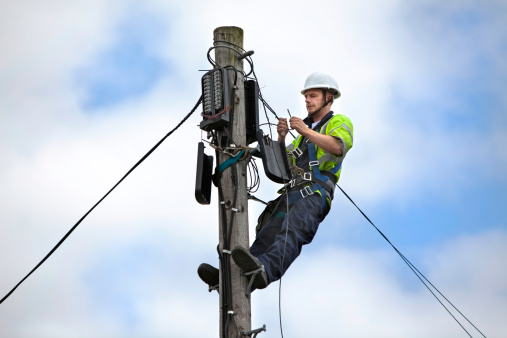Top-Paying Skilled Trades Jobs: Power Line Technician

Not interested in a typical desk job?
Enjoy working outside?
Looking to explore new opportunities in the power or telecommunications industry?
A career as a power line technician may be ideal for you. Here’s why:
- According to the Bureau of Labor Statistics’ Occupational Outlook Handbook, employment of line installers and repairers is projected to grow 8 percent between 2016 and 2026, with the best job opportunities going to those with good technical and mechanical skills.
- Pay for line installers and repairers is high for the level of education required. 2017 median pay for electrical power-line technicians was $69,380 per year and median annual wage for telecommunications technicians was $55,060.
- As the population grows and customers increasingly demand enhanced connectivity, installers and repairers will be needed to provide newer, faster and more reliable access to power and telecommunications services.
As we mentioned in this earlier post on top-paying skilled trades jobs, it’s an exciting time to enter this field, or just find a better opportunity within it.
What does a power line technician do?
Electrical and telecommunications technicians install or repair cables or wires used in electrical or telecommunications power and distribution systems, including fiber optics.
Electrical power-line installers and repairers:
- Install, maintain or repair electrical power lines
- Identify defective devices and equipment
- Inspect and test power lines and related equipment
- String power lines between poles, towers and buildings
- Climb poles and transmission towers and use truck-mounted buckets to get to equipment
- Operate power equipment to complete installations and repairs
Telecommunications line installers and repairers:
- Install, maintain or repair telecommunications equipment
- Inspect or test lines or cables
- Lay underground cable, including fiber optic lines, directly in trenches
- Pull cables in underground conduit
- Install aerial cables, including over lakes or across rivers
- Operate power equipment to complete installations and repairs
- Setup service for customers
The work environment is hazardous, as line workers often operate at great heights around high-voltage electricity. The work can be physically demanding and requires the ability to climb utility poles and transmission towers.
How can you become a line technician?
To start a career as a line installer or repairer, most employers require a high school diploma or equivalent. In addition to strong math and mechanical skills, technical knowledge of electricity or electronics is helpful. Many community colleges and technical schools offer programs in telecommunications, electronics or electricity, and associate degree programs can also provide the technical knowledge you’ll need to start a career as a power line technician.
As an entry-level line worker, you may start out as an apprentice, spending time learning in the classroom while you gain hands-on work experience. After three to four years of working, you may reach the journey level – when you can perform most work tasks without supervision.
Looking for power line jobs?
When you’re searching online, make sure to search for related job titles such as power line installer, electrical line technician, telecommunications equipment repairer and fiber optics technician.
Then contact PrideStaff. With offices across the nation, we’re the ideal career partner to help you find flexible and direct roles with leading power and telecom industry employers. Search skilled trades jobs here.



